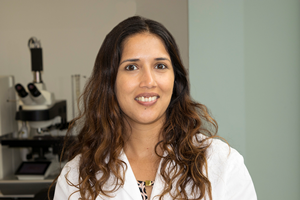 |
| Swasti Kafle |
For decades, Coriell has supplied the world with cell lines and DNA samples for use in biomedical research. To make sure that we are providing only the most accurate, highest quality biomaterials possible, we take quality control very seriously.
A major tool in quality assurance is our talented Cytogenomics team. Swasti Kafle, Coriell's Cytogenomics Team Lead, answered a few questions about her team's role.
What is your team responsible for at Coriell?
We think of ourselves as the gatekeepers of our cell lines. At Coriell we pride ourselves on only distributing cell line of the highest quality. We help decide if the quality of a line is good enough to make it into Coriell's catalog. We ensure that a cell line's genetic integrity and/or identity is maintained or confirmed, before distribution to the scientific community.
Our lab predominantly uses G-banded karyotyping to look at a cell’s chromosomes. We create karyograms, images of a cell’s chromosomes arranged for enabling analysis at the chromosomal level. Once high resolution digital images are captured, we use software to "cut and paste” chromosomes into the paired chromosomes like you typically see in biology or genetics textbooks.
We have come a long way from cutting and pasting karyograms by hand, but while we have a very expensive microscope and camera that captures images and programs that arrange chromosomes into a karyogram, analysis can still only be done by a trained eye. Artificial intelligence is not advanced enough to analyze the chromosomes and pick out abnormalities that can be seen by the highly trained human eye in the karyotypes.
Once the karyograms are assembled, we can examine chromosomes for any undesirable changes that may have arisen over the process of expanding and reproducing the cell line, or reprogramming the cell line, or alternatively, confirm any abnormalities that are supposed to be present in the cell line (i.e confirming a disease trisomy).
What is your team looking for when examining a karyogram?
We analyze chromosomes in a cell to scan for any chromosomal alterations that involve gains or losses of portions of the genome, or rearrangements within and among the chromosomes. Typically, approximately 20-25 cells will be analyzed per cell line, following the American College of Medical Genetics and Genomics (ACMG) guidelines. Once the whole case is analyzed we determine what is reportable and what is kept as a remark for future reference for the case.
Typically, two or more of the same abnormality in a case or expansion must be reported using the International System for Human Cytogenomic Nomenclature (ISCN). If we find an anomaly in a single cell, we assume it to be random and one-off, but we still make note of it for future reference. If we find something in the analysis that compromises the cell line, it is classified as a failed line and is never introduced into the catalog for distribution.
The creation of induced pluripotent stem cells and the quality control associated with that is still a relatively new process. Through our experience and research, we know that iPSC reprograming can cause certain chromosomal abnormalities that introduce undesirable growth advantages. We work closely with the stem cell team to strictly monitor the cell lines during the reprogramming and expansion pipeline.
When a line makes it into Coriell’s online catalog, we know we have put the highest quality of cell line out there for scientists to use.
Why is this level of quality important for the samples at Coriell?
We take pride in knowing that we are putting only the highest quality of cell lines (and DNA) out there for the use of the scientific community. Researchers and companies around the world have come to rely on our products because of our commitment to excellence and quality and the resulting reproducibility of research enabled by the use of our cell lines. Cytogenomic analysis is an important part of maintaining that quality and as a nonprofit we are driven by our mission to advance biomedical research. We never sacrifice quality in the name of time or profit.
What does an average day look like for your team?
We monitor all our upcoming cases to see where they are in the pipeline. We make sure all case information is ready by the time a line comes into the lab for a Cyto harvest. Cell lines ready for harvest take priority over everything else in Cytogenetics because when the cells say they are ready, they are ready!
Once the lines have been harvested we prepare them for analysis. Most of our time is spent on analysis. That in-depth analysis is the most involved of any of our processes, and there are no shortcuts.
What should customers to know about your work?
We love what we do. Both members of the team came from diagnostic cytogenetics backgrounds and we find the work here at Coriell equally satisfying.
The lines we review are being used for research that can advance biomedical research. That could lead to a new treatment for a rare disease or something equally spectacular. It’s an honor to be a part of enabling that process.